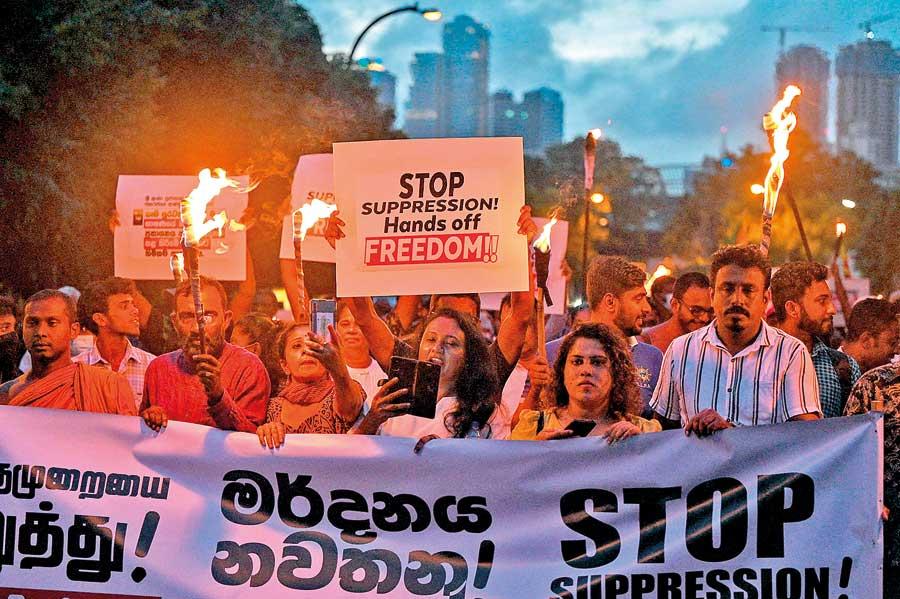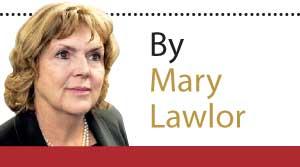Reply To:
Name - Reply Comment

Human Rights Defenders maintain that the Government has been inappropriately using emergency powers to quell demonstrations using force, threats, intimidation and detentions (Pic AFP)
In times of crises, the surest way to steer a country to safer waters is by following a human rights-based approach. In difficult times like these in Sri Lanka, it is precisely human rights defenders (HRDs) that State officials should count on. Human rights defenders have extensive, specialised expertise in working for equality, workers’ rights, the rights of minorities and marginalised communities, the rights of women, and with those seeking truth, justice and reparations for past violations.
defenders (HRDs) that State officials should count on. Human rights defenders have extensive, specialised expertise in working for equality, workers’ rights, the rights of minorities and marginalised communities, the rights of women, and with those seeking truth, justice and reparations for past violations.
But the Government of President Ranil Wickremesinghe doesn’t seem to be drawing on this expertise or supporting the work of HRDs. I’ve been meeting with HRDs in the country in recent weeks and been following dozens of cases where they are being targeted. And while I’ve been in contact with the Sri Lankan authorities on human rights concerns in the past, it feels like the country has taken a particularly dark turn.
I’ve heard direct form HRDs that the Government has been inappropriately using emergency powers to quell demonstrations through the use of force, threats, intimidation and detentions.
Local HRDs have told me about journalists being abducted and tortured by the armed forces, of public officials smearing HRDs as vandals and rioters, and encouraging attacks against them. I’ve heard of arbitrary detentions of protesters, of raids at homes and offices of NGOs and intimidation of HRDs’ family members.
"I’ve been meeting with HRDs in the country in recent weeks and been following dozens of cases where they are being targeted. And while I’ve been in contact with the Sri Lankan authorities on human rights concerns in the past, it feels like the country has taken a particularly dark turn"
I have received detailed reports of how, on 18 August, Chintaka Rajapakse, a moderator for the Movement for Land and Agricultural Reform (MONLAR), was detained for over a week after being arrested from a protest that was dispersed by police with tear gas, water cannons and batons. I have also heard how Fr. Jeewantha Peiris was detained and received a travel ban after speaking out publicly against corruption and poverty.
We’ve seen again recently the misuse of the problematic “Prevention of Terrorism Act” against critical voices in the country. Similar tactics are used all over the world - governments take legislation designed to stop attacks on innocent lives, and weaponize it against peaceful critics.
Since I took up this mandate as Special Rapporteur, I have joined with other UN experts to provide recommendations to repeal and replace the Prevention of Terrorism Act, which contains an overly broad definition of terrorism, that may allow the police and military to detain human rights defenders on suspicion of “terrorist” association for prolonged periods with low fair trial guarantees. But little has been done to substantially reform the law.
But we must not let setbacks deter us. Joseph Stalin, a voice for education rights and reforms, who has more recently focused on calling for good governance, was sent to prison earlier this month for his role in organising peaceful demonstrations. Thanks to Sri Lanka’s well networked, strong civil society, Joseph is now free, having been granted bail after five days in detention.
Building networks among HRDs can be very effective, and HRDs can benefit from international and regional experience and solidarity in times of great adversity.
By following a human rights-based approach, and drawing on that rich experience of local HRDs, the Sri Lankan government can ensure reforms are fair, democratic, and in line with the international obligations it has promised to implement.
Anybody put at risk for their work peacefully defending the rights of others can count on my support. I stand ready to work with local HRDs, and with the Government of Sri Lanka, and hope they will work with me.
(The writer is the United Nations Special Rapporteur on the situation of human rights defenders)